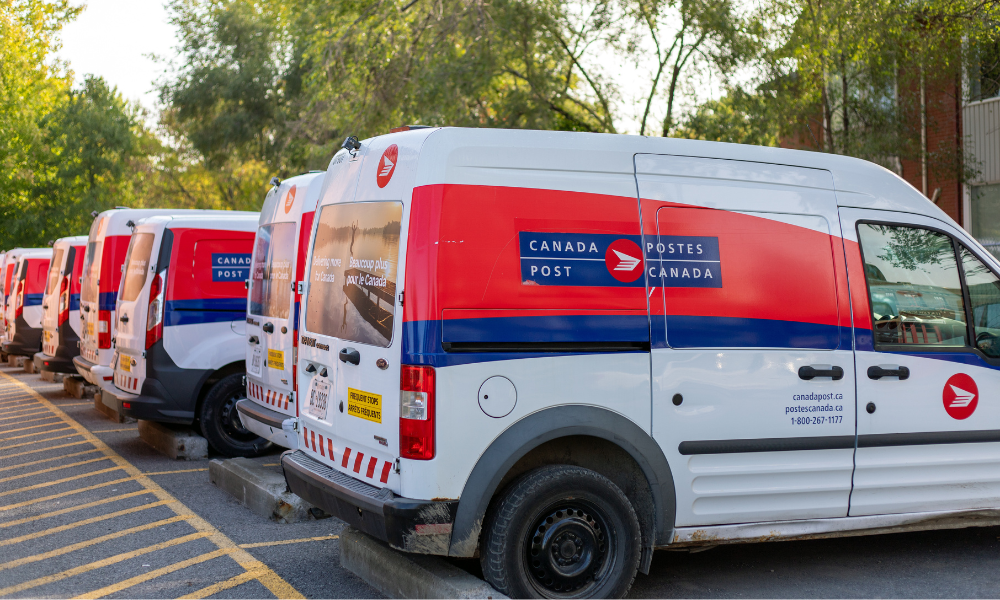Small businesses seek solutions as postal strike stretches into its sixth day

The Canada Post strike has reached its sixth day, following failed negotiations between the Crown corporation and the Canadian Union of Postal Workers (CUPW).
More than 55,000 postal workers began picketing last week after year-long talks broke down, just as the holiday shopping season began with Black Friday sales.
The strike has brought to light key issues, including wages, pensions, medical leave, and Canada Post’s controversial plan for seven-day parcel delivery.
Both sides remain far apart on wage proposals. Canada Post has offered an 11.5 percent increase over four years, while the CUPW is demanding 24 percent over the same period.
The union has accused the corporation of poor faith negotiations, with representatives claiming, “Canada Post left us no choice when it threatened to change our working conditions and leave our members exposed to layoffs.”
The union has also criticised Canada Post’s plan for seven-day delivery, warning that it could lead to an increased reliance on contract workers. CUPW President Jan Simpson noted that the service has existed since 2018 and previously operated in Montreal.
However, she raised concerns about Canada Post’s reliance on part-time workers, stating, “For us, we try to create and keep good, full-time jobs.”
Jon Hamilton, Canada Post’s vice-president of strategic communications, defended the proposed changes as necessary for the corporation’s future.
“We need to make changes to our delivery model to bring some flexibility in so we can be more competitive and grow our parcel business,” he said.
Efforts to resolve the strike have continued with the assistance of a special mediator. Hamilton explained, “We’re in day three with the special mediator. We’ve had the assistance of mediators since October, but this is a different step, with a special mediator that’s working with the parties.”
The strike has hit small businesses particularly hard. Many rely on Canada Post for shipping goods, sending invoices, and receiving payments.
The Canadian Federation of Independent Business (CFIB) reported that 80 percent of small businesses depend on the postal service for some part of their operations.
Corinne Pohlmann, CFIB’s executive vice-president of advocacy, said, “Consumer demand seems lower than expected because people are unsure about delivery timelines and some are staying away from shopping altogether, fearing delays. Members are worried about receiving their inventory in time for the Christmas season. It’s just the next big obstacle they have to deal with.”
Small retailers, such as Sparta Country Candles in Ontario, are feeling the financial strain. Owner Mary Muscat described the impact on her business.
“We’re a one-store operation, in a small village of 200 people. We’ve been here for 32 years,” she said. Muscat noted that shipping costs have increased, and the store has lost the edge of affordable Canada Post services.
“We have to take our parcels into town, which is 20 minutes away, to the one small UPS outlet. Our courier company can’t deliver cheaper than Canada Post, so we’ve lost that edge,” she added.
Muscat explained that 50 percent of her business relies on the holiday season and expressed concerns about delayed payments.
“We’re dependent on getting payments in 30 days by cheque, and that’s not going to happen anymore. We can try e-transfer, but not all companies are set up to accommodate that,” she said.
The strike has also disrupted deliveries for individual Canadians during the busiest shopping period of the year. With Black Friday sales underway and the holidays approaching, consumers are facing uncertainties.
Shannon Terrell, spokesperson for NerdWallet Canada, advised Canadians to adapt. “For everyday Canadians caught in this delivery debacle, adaptation will be key — whether it be local in-person shopping, click-and-collect options from major retailers, or digital gift-giving alternatives,” she said.
According to NerdWallet Canada’s holiday survey, 26 percent of Canadians plan to give fewer gifts this year to avoid delivery disruptions.
The strike comes as Canada Post faces significant financial challenges. The corporation reported a $490m loss in the first half of 2024, adding to over $3bn in cumulative losses since 2018.
The ongoing strike has compounded these difficulties, with Teamsters Canada announcing that its Purolator members will not handle packages originating from Canada Post.
Hamilton acknowledged the damage to Canada Post’s reputation.
“The hit to our reputation, to the trust we have with our customers, has taken a massive hit. We’re taking a step in the wrong direction right now…we’re going to have to be focused on building back the trust from Canadians,” he said.
Labour Minister Steven MacKinnon has appointed mediators to assist in the negotiations but has not indicated whether back-to-work legislation is under consideration.
In 2018, the federal government ended a 36-day rotating strike through legislation, a move criticised by labour groups.
Simpson argued against government intervention, stating, “We know that the best contracts are those that are negotiated at the table, with experts from both sides trying to resolve issues.”
Canada Post has warned that the strike’s backlog could cause delays extending into 2025.
Despite the disruption, CUPW workers have ensured the delivery of socioeconomic cheques, such as the Canada Child Benefit and Old Age Security, to minimise the impact on vulnerable Canadians.
However, Simpson criticised Canada Post’s response to the strike, particularly its decision to issue a lockout.
She noted, “They’ve taken away our wages, benefits, and pay for those with vacations booked,” highlighting how vulnerable employees have been affected.



